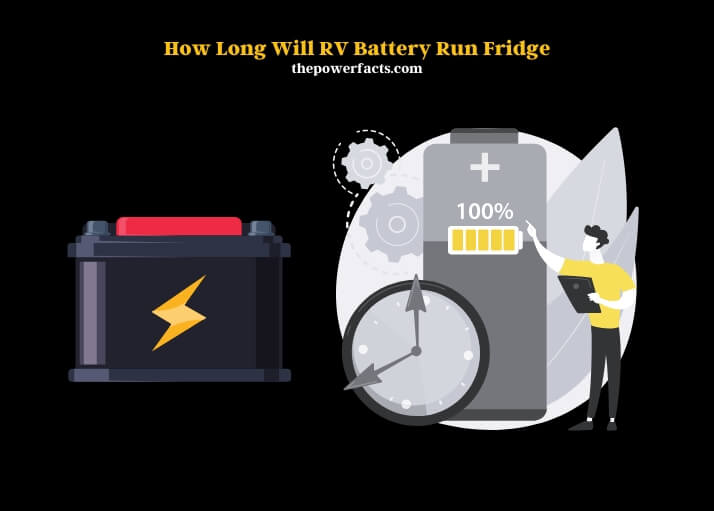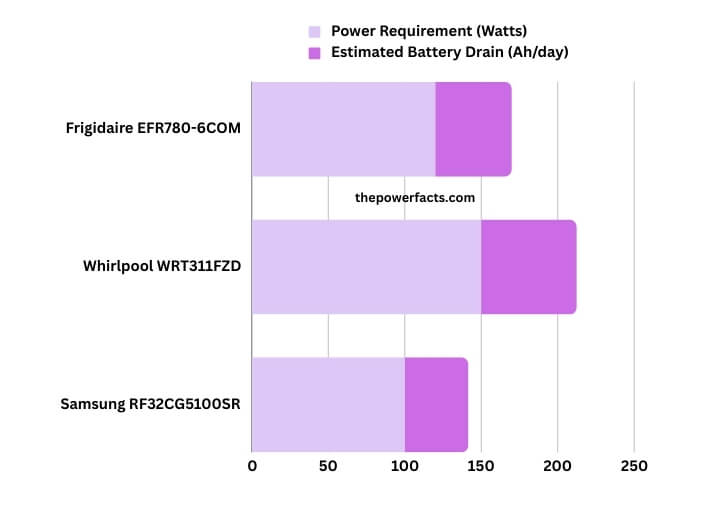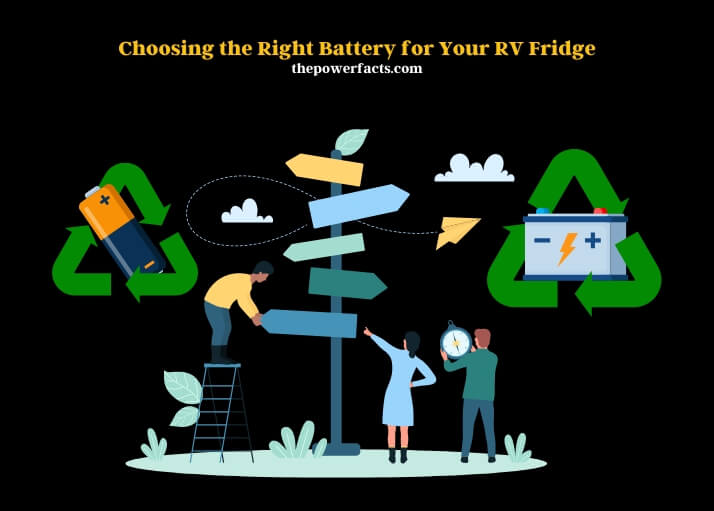The duration an RV battery will run a fridge depends on several factors, including the battery’s capacity and the fridge’s power consumption. Typically, a fully charged RV battery can power a fridge for about 12 to 48 hours without recharging.
RV enthusiasts often ponder the efficiency of their mobile refrigeration systems, especially when planning for extended off-grid adventures. The key to maximizing fridge runtime lies in understanding the interplay between the fridge’s energy requirements and the battery’s storage capacity. RV fridges vary in size and type, each with different power demands.
Absorption fridges, for instance, are common in RVs and can run on electricity, gas, or both, affecting how long the battery lasts. Battery capacity, measured in amp-hours (Ah), dictates the energy available to power appliances. A larger capacity battery provides more energy, extending the fridge’s running time.

Moreover, external factors such as ambient temperature significantly influence fridge efficiency. High temperatures force the fridge to work harder, draining the battery faster. Strategies to extend battery life include improving insulation around the fridge, parking in shaded areas, and using solar panels to supplement power.
Selecting the right battery technology, like lithium-ion over traditional lead-acid, can also make a substantial difference due to higher energy density and efficiency. Understanding these aspects helps RV owners plan effectively, ensuring their fridge keeps running smoothly throughout their journey.
Factors Influencing RV Battery Lifespan with Refrigeration
The duration an RV battery will power a refrigerator hinges on several critical factors. The size and type of the fridge are paramount; larger fridges or those with inefficient designs consume more power. Battery capacity, measured in amp-hours (Ah), directly affects how long it can run any appliance, including a fridge.
External temperatures play a role; hotter climates force fridges to work harder, draining batteries more quickly. These variables helps in planning and managing RV battery life for refrigeration needs effectively.
Estimating Battery Drain by RV Fridges
To accurately estimate how long an RV battery can run a fridge, one must consider the fridge’s average power consumption. This consumption is typically measured in watts (W) and can vary significantly between models. By converting this consumption into amp-hours, RV owners can gauge the battery drain. The table below illustrates the power requirements of various RV fridge models and their estimated battery drain.
| Fridge Model | Power Requirement (Watts) | Estimated Battery Drain (Ah/day) |
| Frigidaire EFR780-6COM | 120 | 50 |
| Whirlpool WRT311FZD | 150 | 62.5 |
| Samsung RF32CG5100SR | 100 | 41.7 |
This analysis is crucial for planning and can help in selecting both a fridge and a battery that match the RV user’s needs.

Strategies for Maximizing RV Battery Life
Maximizing the life of an RV battery, especially when running a fridge, involves several strategies. Utilizing solar panels can significantly extend battery life by providing a continuous charge during daylight hours. Choosing the right battery type is also critical; for example, Lithium batteries offer more usable capacity and longer life compared to traditional lead-acid batteries.
Implementing energy conservation techniques, such as minimizing the opening of the fridge door and ensuring the fridge is efficiently packed, can also reduce power consumption. Balancing fridge use with battery capacity and recharge options is key to sustainable RV living.
Real-World Experiences of RV Battery and Fridge Usage
Drawing from real-world experiences provides valuable insights into managing RV battery life with refrigeration needs. Many RV users report varying results based on their setups and usage patterns. The following table summarizes user reports on battery duration and fridge settings, offering a glimpse into what can be expected under different conditions.
| User | Battery Type | Fridge Setting | Duration |
| John | AGM | Medium | 48 hours |
| Lisa | Lithium | Low | 72 hours |
| Mark | Lead-Acid | High | 24 hours |
These experiences underscore the importance of selecting the right battery and fridge settings to optimize battery life.
Choosing the Right Battery for Your RV Fridge
Selecting the appropriate battery for an RV fridge involves understanding the specific needs of your RV setup and the characteristics of different battery types. Amp-hour ratings indicate how much energy a battery can store and deliver over time, a crucial factor in determining how long it can run a fridge.
Battery technology also matters; Lithium-ion batteries, for instance, are more efficient and have a longer lifespan than AGM (Absorbent Glass Mat) or traditional lead-acid batteries. Considering these factors ensures the selection of a battery that meets the demands of running an RV fridge effectively.

FAQs
Impact of Ambient Temperature on RV Fridge Efficiency
Ambient temperature plays a crucial role in determining how efficiently an RV fridge operates on battery power. High external temperatures can cause the fridge to work harder to maintain cool temperatures, thereby consuming more battery power. In contrast, cooler ambient conditions can enhance fridge efficiency, reducing the battery load.
This relationship is vital for RV owners to understand, especially when traveling through areas with varying climates. Proper insulation around the fridge and parking in shaded areas can mitigate the impact of high temperatures, ensuring the battery lasts longer.
Role of Fridge Size and Type in Battery Consumption
The size and type of fridge in your RV significantly influence battery drain. Larger fridges or those with freezer compartments require more energy to cool, leading to quicker battery depletion. Absorption fridges, commonly used in RVs, operate differently from residential fridges and have varying energy demands based on size and cooling method.
The specific power requirements of your RV fridge is essential for estimating battery life. This knowledge helps in planning energy usage and selecting the right battery size to meet your refrigeration needs.
Battery Capacity and Its Effect on Running Time
Battery capacity, measured in amp-hours (Ah), directly affects how long your RV fridge can run without recharging. A higher capacity battery can store more energy, allowing your fridge to operate longer. This section will delve into how to calculate your fridge’s energy consumption and match it with the appropriate battery capacity. It’s also important to consider the depth of discharge (DoD) for different battery types, as this impacts the usable capacity and overall battery life.
Optimizing RV Battery Life for Refrigeration
Maximizing the battery life while running an RV fridge involves several strategies beyond just selecting the right battery. Incorporating solar panels can provide a continuous charge during daylight hours, reducing dependency on the battery alone.
Managing the energy consumption of other appliances in the RV can prevent unnecessary battery drain. This holistic approach to energy management ensures that your fridge and other essential appliances can run efficiently during your travels.
Selecting the Appropriate Battery Technology
Choosing the right battery technology is critical for efficient fridge operation in an RV. Lithium-ion batteries, for example, offer a higher energy density and a longer lifespan compared to traditional lead-acid batteries. They also have a better DoD, meaning you can use more of the battery’s capacity without negatively affecting its longevity.
This section will guide you through the pros and cons of different battery types, helping you make an informed decision based on your RV’s specific needs and your travel habits.
In summary, the key to efficiently running an RV fridge on battery power lies in understanding the factors that influence battery life, accurately estimating battery drain, implementing strategies to maximize battery life, learning from the experiences of other RV users, and choosing the right battery for your needs. By addressing these areas, RV owners can enjoy the convenience of refrigeration without the worry of prematurely depleting their battery resources.